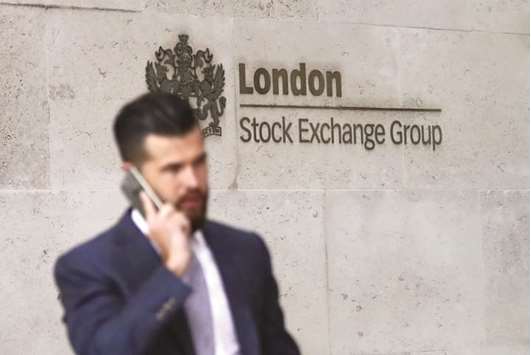The world’s stock markets slid again yesterday as investors sought safe havens amid tensions between the United States and North Korea, despite an easing in rhetoric.
European equities indexes were a sea of red at the close, while Wall Street also posted sizeable losses.
“Risk aversion is once again the name of the game... as geopolitical tensions mount and investors head for cover in the traditional safe havens,” said Oanda analyst Craig Erlam.
For now it seems that “traders still believe the prospect of military action is very small but precautions are still being taken nonetheless, as this still has the potential to escalate very quickly and unexpectedly,” he said.
London’s benchmark FTSE 100 index was down 1.4% to 7,389.94 points at the closing bell, also driven lower by losses in the commodity sector.
In the eurozone, the Paris CAC 40 lost 0.6% at 5,115.23 and Frankfurt’s DAX 30 shed some 1.2% to 12,014.30 at close yesterday.
Pyongyang’s detailed strike plan against Guam has created “a sour backdrop to trading”, said Spreadex analyst Connor Campbell.
Safe havens benefited from the move away from stocks with gold rising by just under 1% after surging 1.3% on Wednesday.
The European and American dips followed similar trading in Asia, where equities were also back in the red, snuffing out a nascent recovery as tensions over North Korea lingered for a second day.
Markets had taken heart earlier in the day after US Secretary of State Rex Tillerson sought to play down the escalating war of words between Washington and Pyongyang.
But losses soon resumed, with Tokyo edging down as the Nikkei again came under pressure from the strength of the safe-haven yen, which hit eight-week highs Wednesday against the dollar.
Angry exchanges over Pyongyang’s nuclear and missile programmes are stoking fears of a miscalculation that could lead to catastrophic consequences on the Korean peninsula and beyond.
The sabre-rattling – sparked when President Donald Trump stunned the world with an apocalyptic warning to unleash “fire and fury” on North Korea – continued yesterday as Pyongyang mocked the US leader as “bereft of reason”.
The reclusive state raised the stakes further with a detailed plan to send a salvo of missiles towards the US territory of Guam.
Markets had earlier stabilised as Tillerson tried to ease tensions, saying he did not believe there is “any imminent threat” to Guam, and expressed hope diplomacy would prevail.
Despite the ongoing turmoil, investors’ focus was slowly returning to the US economy after Chicago Federal Reserve president Charles Evans said Wednesday it would be “reasonable” to announce the beginning of a reduction of the Fed’s balance sheet next month.
But he also cautioned disappointing inflation data may delay interest rate increases.
On commodities markets, oil advanced initially after figures from industry group the American Petroleum Institute showed a sharp decrease in stockpiles.
But then the oil price succumbed to the overall selling pressure for risky assets, aided by an Opec report showing that crude oil production by Opec members increased slightly in July, including Saudi Arabia, which had championed efforts by the organisation and its allies to extend an output freeze.

A pedestrian walks past the London Stock Exchange. The benchmark FTSE 100 index lost 1.4% to 7,389.94 points yesterday.


